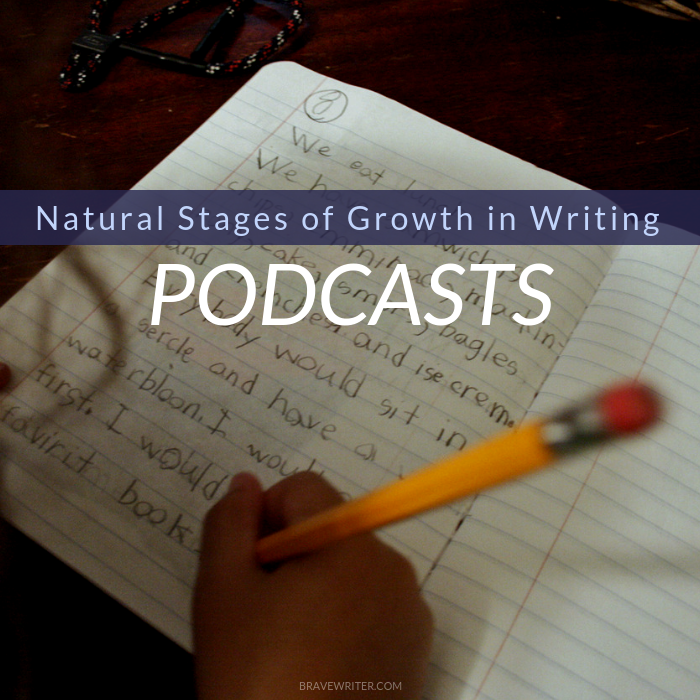[Podcast] Natural Stages of Growth in Writing

Understanding a young writer’s stages of growth is vital. In my years of working with families, I’ve found that it is much more effective to look at how writers grow naturally than to focus on scope and sequence, grade level, ages, or the types of writing that ought to be done in some “established sequence.”
The different stages are briefly explained on the Brave Writer website, but check out the following podcasts for a more in depth look. Just click on the titles below to be linked to each page.
Also, the age ranges are only a suggestion. Identify the stage that best matches your child’s current skill set. Start where your child is.
Beginning Writers (Ages 5-7)
Does your child excitedly share stories and experiences but is blocked when she tries to write them down? Does his writing not reflect his sophisticated vocabulary? Do they struggle with handwriting or spelling? Before kids can write their thoughts and ideas, someone else needs to do it for them!
Emerging Writers (Ages 8-10)
Focuses on the most overlooked stage of development in the writing journey and accounts for the development of writer’s block and writing resistance in kids. If you successfully navigate the Partnership Writing phase, your kids will not be plagued with the “blank page, blank stare” syndrome. You’ll both know how to create writing and what role you each play in the process.
Middle School Writers (Ages 11-13)
The stop and start stage of writing. One day the student gets a detailed story to paper. The next week, she complains that she hates writing. In this podcast we look at how you can create the conditions for growth and joy in writing with your kids.
High School Writers (Ages 14-18)
This is the time when your students are making the somewhat treacherous journey from adorable, fact-centered child to rhetorical imagination (the awareness that the world is inhabited by unlimited numbers of perspectives). We talk about your role in the “Big Juicy Conversations” you need to be having with your fledgling thinkers, and we discuss the high school writing life, on into college.



















I return to these podcasts over and over again, Julie. There is such great information provided in each of them. Thank you!
Thank you for saying so! Noah and I so enjoyed making them. We’ve got another one complete. I need to get it posted!
[…] these four steps each time your child moves up one rung of the natural stages of growth in writing ladder. If you take seriously the period of written exploration, teaching the format that follows […]
[…] completing the five part series about the Natural Stages of Growth in Writing, I thought it might be nice to see how you can apply those insights to writing through the coming […]
[…] where we’re going when we start, we don’t know what it means to teach or understand developmental stages of growth, we have no yardsticks to measure our progress, or colleagues to meet with in the […]
[…] Kids in that stage are often between the ages of five and eight, but age doesn’t matter so much. What matters is where they are in the Natural Stages of Growth. […]
[…] But the fact that they can write to a specific genre shows you that formats can be a part of the natural growth of a young writer. Formats aren’t just invented writing techniques that exist in a […]
[…] Why isn’t my child of 10 spelling well? This is answered quickly in a book that explains the natural stages of growth in writing. 10 year olds don’t spell well. Here’s why, here’s how to foster the continued […]
[…] paper (at any age), it is impossible to teach it until he is. We must start with the writer in the developmental stage in which he finds […]